Unit 4 Don’t eat in class复习课课件(共17张PPT)
文档属性
| 名称 | Unit 4 Don’t eat in class复习课课件(共17张PPT) | 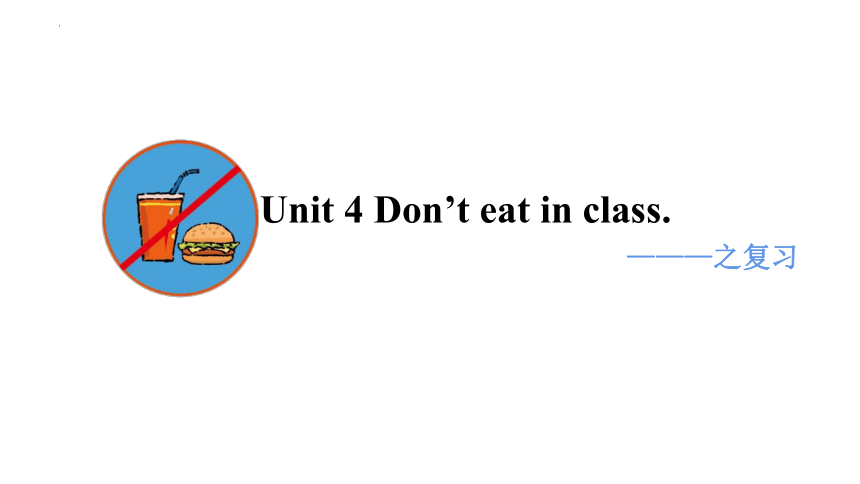 | |
| 格式 | pptx | ||
| 文件大小 | 252.2KB | ||
| 资源类型 | 教案 | ||
| 版本资源 | 人教新目标(Go for it)版 | ||
| 科目 | 英语 | ||
| 更新时间 | 2022-04-25 06:58:35 | ||
图片预览

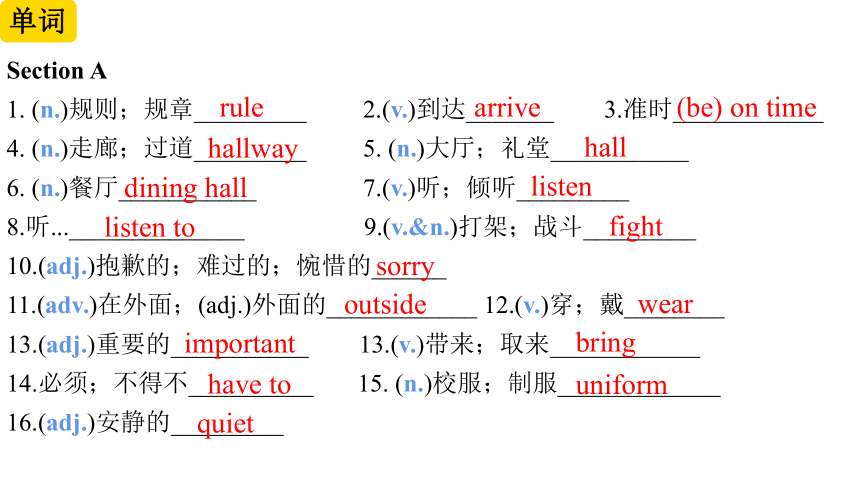
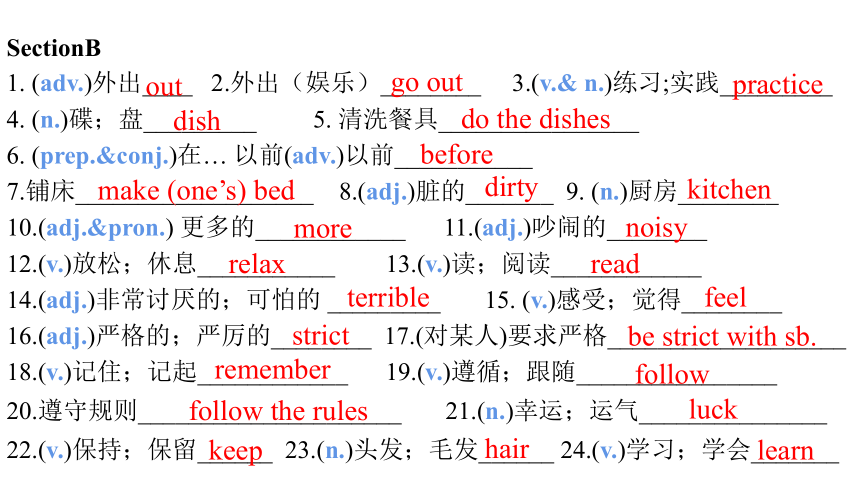
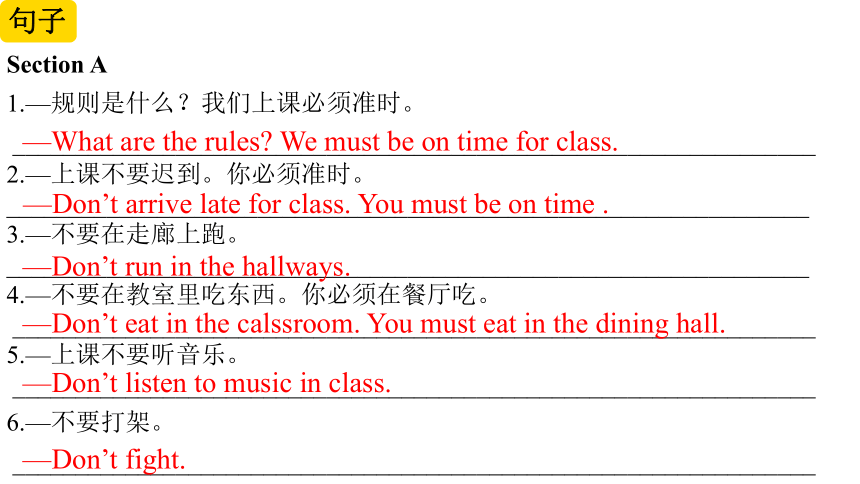
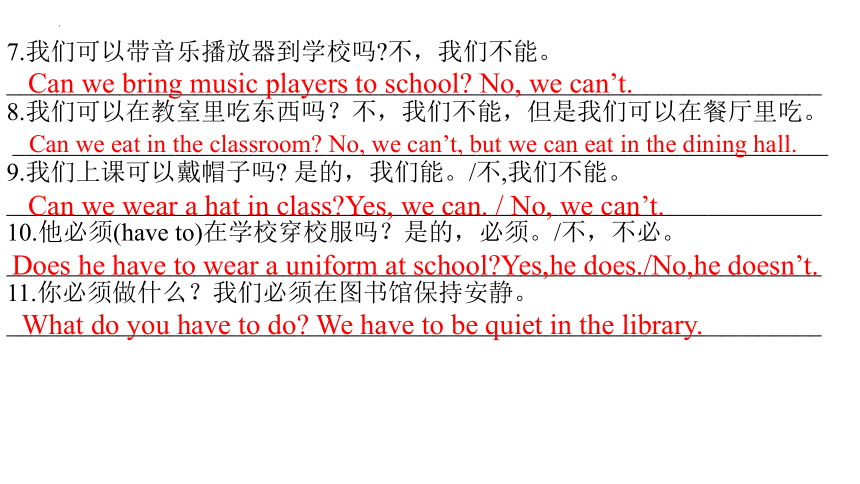
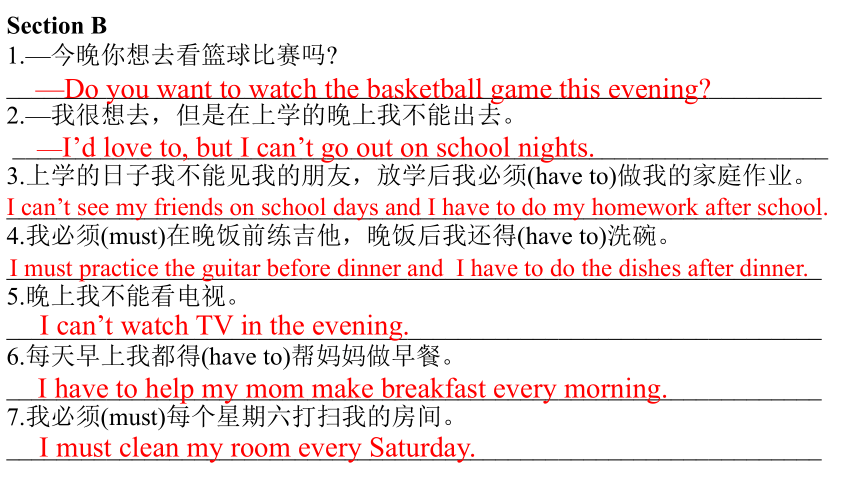
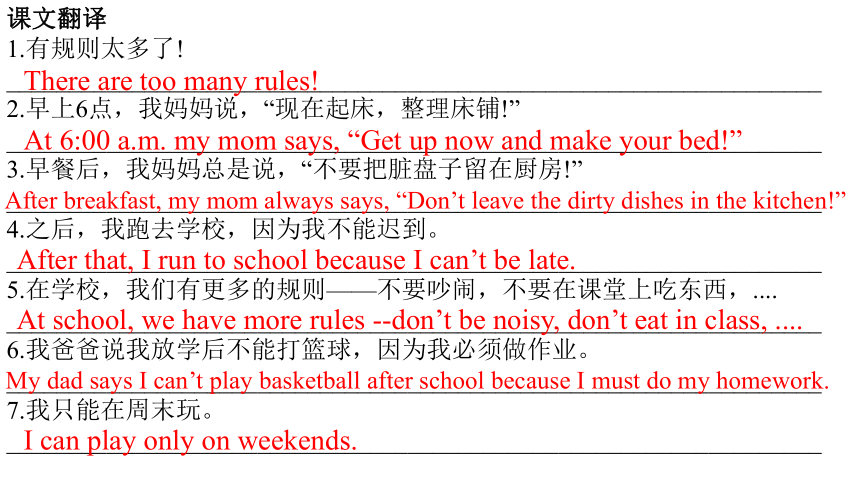
文档简介
(共17张PPT)
Unit 4 Don’t eat in class.
———之复习
单词
Section A
1. (n.)规则;规章_________ 2.(v.)到达_______ 3.准时____________
4. (n.)走廊;过道_________ 5. (n.)大厅;礼堂___________
6. (n.)餐厅___________ 7.(v.)听;倾听_________
8.听...______________ 9.(v.&n.)打架;战斗_________
10.(adj.)抱歉的;难过的;惋惜的______
11.(adv.)在外面;(adj.)外面的____________ 12.(v.)穿;戴________
13.(adj.)重要的___________ 13.(v.)带来;取来____________
14.必须;不得不__________ 15. (n.)校服;制服_____________
16.(adj.)安静的_________
rule
arrive
(be) on time
hallway
hall
dining hall
listen
listen to
fight
sorry
outside
wear
important
bring
have to
uniform
quiet
SectionB
1. (adv.)外出____ 2.外出(娱乐)________ 3.(v.& n.)练习;实践_________
4. (n.)碟;盘_________ 5. 清洗餐具________________
6. (prep.&conj.)在… 以前(adv.)以前___________
7.铺床___________________ 8.(adj.)脏的_______ 9. (n.)厨房________
10.(adj.&pron.) 更多的____________ 11.(adj.)吵闹的________
12.(v.)放松;休息___________ 13.(v.)读;阅读____________
14.(adj.)非常讨厌的;可怕的 _________ 15. (v.)感受;觉得________
16.(adj.)严格的;严厉的________ 17.(对某人)要求严格___________________
18.(v.)记住;记起____________ 19.(v.)遵循;跟随________________
20.遵守规则_____________________ 21.(n.)幸运;运气_______________
22.(v.)保持;保留______ 23.(n.)头发;毛发______ 24.(v.)学习;学会_______
out
go out
practice
dish
do the dishes
before
make (one’s) bed
dirty
kitchen
more
noisy
relax
read
terrible
feel
strict
be strict with sb.
remember
follow
follow the rules
luck
keep
hair
learn
句子
Section A
1.—规则是什么?我们上课必须准时。
________________________________________________________________
2.—上课不要迟到。你必须准时。
________________________________________________________________
3.—不要在走廊上跑。
________________________________________________________________
4.—不要在教室里吃东西。你必须在餐厅吃。
________________________________________________________________ 5.—上课不要听音乐。
________________________________________________________________
6.—不要打架。
________________________________________________________________
—Don’t arrive late for class. You must be on time .
—Don’t run in the hallways.
—Don’t eat in the calssroom. You must eat in the dining hall.
—Don’t listen to music in class.
—Don’t fight.
—What are the rules We must be on time for class.
7.我们可以带音乐播放器到学校吗 不,我们不能。_________________________________________________________________
8.我们可以在教室里吃东西吗?不,我们不能,但是我们可以在餐厅里吃。
_________________________________________________________________
9.我们上课可以戴帽子吗 是的,我们能。/不,我们不能。 _________________________________________________________________
10.他必须(have to)在学校穿校服吗?是的,必须。/不,不必。_________________________________________________________________
11.你必须做什么?我们必须在图书馆保持安静。_________________________________________________________________
Can we bring music players to school No, we can’t.
Can we eat in the classroom No, we can’t, but we can eat in the dining hall.
Can we wear a hat in class Yes, we can. / No, we can’t.
Does he have to wear a uniform at school Yes,he does./No,he doesn’t.
What do you have to do We have to be quiet in the library.
Section B
1.—今晚你想去看篮球比赛吗 _________________________________________________________________
2.—我很想去,但是在上学的晚上我不能出去。
_________________________________________________________________
3.上学的日子我不能见我的朋友,放学后我必须(have to)做我的家庭作业。_________________________________________________________________
4.我必须(must)在晚饭前练吉他,晚饭后我还得(have to)洗碗。_________________________________________________________________
5.晚上我不能看电视。_________________________________________________________________
6.每天早上我都得(have to)帮妈妈做早餐。_________________________________________________________________
7.我必须(must)每个星期六打扫我的房间。
_________________________________________________________________
I can’t see my friends on school days and I have to do my homework after school.
I must practice the guitar before dinner and I have to do the dishes after dinner.
—Do you want to watch the basketball game this evening
—I’d love to, but I can’t go out on school nights.
I can’t watch TV in the evening.
I have to help my mom make breakfast every morning.
I must clean my room every Saturday.
课文翻译
1.有规则太多了!
_________________________________________________________________
2.早上6点,我妈妈说,“现在起床,整理床铺!”
_________________________________________________________________
3.早餐后,我妈妈总是说,“不要把脏盘子留在厨房!”
_________________________________________________________________
4.之后,我跑去学校,因为我不能迟到。_________________________________________________________________
5.在学校,我们有更多的规则——不要吵闹,不要在课堂上吃东西,....
_________________________________________________________________
6.我爸爸说我放学后不能打篮球,因为我必须做作业。_________________________________________________________________
7.我只能在周末玩。_________________________________________________________________
There are too many rules!
At 6:00 a.m. my mom says, “Get up now and make your bed!”
After breakfast, my mom always says, “Don’t leave the dirty dishes in the kitchen!”
After that, I run to school because I can’t be late.
At school, we have more rules --don’t be noisy, don’t eat in class, ....
My dad says I can’t play basketball after school because I must do my homework.
I can play only on weekends.
8.晚饭后,我也不能放松。_________________________________________________________________
9.在我看电视之前我必须先读书。_________________________________________________________________
10.但我必须在10点前睡觉。_________________________________________________________________
11.规则,规则,规则!这是可怕的!我该怎么办?Know医生
_________________________________________________________________
12.我知道你的感受。_________________________________________________________________
13.人们总是告诉我们,“不要这样做!”或者“你不能这么做!”
_________________________________________________________________
14.但是想想吧,莫丽。你可以做很多事情。_________________________________________________________________
After dinner, I can’t relax either.
I must read a book before I can watch TV.
But I have to go to bed before 10:00.
Rules, rules, rules! It’s terrible! What can I do, Dr. Know
I know how you feel.
People always tell us, “ Don’t do this!” or “You can’t do that!”
But think about it, Molly. There are a lot of things you can do.
15.你可以在周末打篮球。_________________________________________________________________
16.你可以在读完一本书后看电视。_________________________________________________________________
17.父母和学校有时是严格的。
_________________________________________________________________
18.但记住,他们制定规则来帮助我们。_________________________________________________________________
19.我们得遵守他们。_________________________________________________________________
20.好运!_________________________________________________________________
21.在学校,我得(have to)留短发。_________________________________________________________________
You can play basketball on weekends.
You can watch TV after you read a book.
Parents and schools are sometimes strict.
But remember, they make rules to help us.
We have to follow them.
Good luck!
At school, I have to keep my hair short.
There are too_______ (much) rules in my home. Every morning, my mom _________(say) , “Get up now and _________(make) your bed!” After breakfast, my mom always says, “Don’t leave the dirty________ (dish) in the kitchen!” After that, I run to school __________ I can’t __________(late). At school, we have more _______(rule)-Don’t be ________(noise), don’t eat ______ class,… My dad says I can’t play basketball _______ school because I must do my homework first. I can play only ______ weekends. After dinner, I can’t relax, _________. I must read a book________ I can watch TV. _______ I have to go to bed before 10:00. Rules,Rules,Rules! It’s terrible! What can I do, Dr.Know
dishes
be late
make
because
rules
many
either
noisy
on
课文语法填空
says
in
after
before
But
I know_______ you feel. People always tell us, “Don’t do this!” _____ “You can’t do that.” But think _________ it, Molly. There are a _________ of things you can do. You can play basketball on weekends. You can _________ TV after you read a book. Parents and schools are sometimes strict, but remember, they make rules ____________(help) us. We have to follow ________(they).
about
to help
lot
watch
how
课文语法填空
or
them
用于表达命令、请求、劝告、警告、禁止等的句子叫做祈使句。祈使句最常用于表达命令。祈使句因对象(即主语)是第二人称,所以通常都省略主语。以动词原形开头,句末则使用句号或叹号。Go and wash your hands.(命令)Be quiet, please. (请求)Be kind to your sisters. (劝告)Look out! Danger! (警告)Keep off the grass.勿践踏草坪。(禁止)
祈使句
——之含义
去洗你的手。
请安静。
对妹妹要和善。
祈使句
——之类型
Do型 动词原形(+宾语)+其他成分 Come here. 到这儿来。
Stand up. 起立!
Be型 Be+表语(名词或形容词)+其他 Be a good child. 要做一个好孩子。
Be quiet. 安静。
Let型 Let+宾语+动词原形+其他成分 Let me help you.让我来帮助你。Let’s go ! 咱们走吧!
(1)肯定祈使句:
注意:有时可在祈使句的句首或句尾加上please,使语气显得客气、有礼貌。如果在句尾加please,应该用逗号与前句隔开。
祈使句
——之类型
(2)否定祈使句:
Do型 Don’t +肯定祈使句 Don’t forget me.
Don’t eat in the classroom.
Be型 Don’t +肯定祈使句 Don’t be late for class.
Let型 Don’t +肯定祈使句 Don’t let him go.
Let +宾语+not+动词原形+ ... Let him not go.
No型 No+名词/动词-ing 表示禁止或规劝,常用于公共场所。 No photos! 禁止拍照!
No smoking!禁止吸烟!
must / have to
must (情态动词) have to (动词短语)
含义 “必须、一定”,强调说话人主观看法;也可表示命令、愿望 must +动词原形 “不得不”,强调客观需要have to +动词原形
时态 一般只表现在,无人称和数的变化 Eg: He must work. 可用于不同时态,有人称和数的变化(have to→has to)
Eg: He has to wear a jacket.
否定 “mustn’t ” 千万不能、禁止 Eg: You mustn’t swim in the river. 你们不准在河里游泳。 借助助动词do/ does
“don’t/doesn’t have to” 不必、不需要
疑问 以must开头的一般疑问句,肯定回答:用must否定回答:用needn’t/ don’t have to(不需要,不必) Eg:- Must I go now - Yes, you must.- No, you needn’t.(No,you don’t have to. ) 借助助动词do/ does
肯定句:I have to go home.
一般疑问句:Do you have to go home
Yes,I do. ’t.
作文
开头:①有人想要了解你的家规/校规... You want to know the rules of... , right Now let me tell you about them.
结尾:I think we have too many rules.What about yours
② 介绍自己或他们的家规/校规... I have/She has many family rules...或Let me tell you some of my family rules...
I don’t like the rules.I think they are terrible. /I don’t think the rules are strict.
We must follow them because they’re good for us.
③有太多的规则,想想别人寻求帮助。Can you help me I’m not happy because I have too many rules /there are too many rules at home/school.
I never have fun.What can I do
作文
假如下面是你父母为你制订的一些家规。请你以“My Family Rules”为题,写一篇80词左右的英语短文。1. 每天早上六点必须起床,七点去上学;2. 下午六点之前必须到家:3. 不能在外面吃饭;4. 在上学日的晚上,不能看电视和玩电脑游戏;5. 晚上九点半之前必须上床睡觉。
My Family Rules
I have many rules in my family.
and go to school at seven o’ clock. I must get home before six o’ clock in the afternoon. I can’ t eat out. I can’ t watch TV and play computer games on school nights. And I must go to bed before nine thirty in the evening. I don’ t like these rules. I think they are terrible.
Every morning I have to get up at six o’ clock
Unit 4 Don’t eat in class.
———之复习
单词
Section A
1. (n.)规则;规章_________ 2.(v.)到达_______ 3.准时____________
4. (n.)走廊;过道_________ 5. (n.)大厅;礼堂___________
6. (n.)餐厅___________ 7.(v.)听;倾听_________
8.听...______________ 9.(v.&n.)打架;战斗_________
10.(adj.)抱歉的;难过的;惋惜的______
11.(adv.)在外面;(adj.)外面的____________ 12.(v.)穿;戴________
13.(adj.)重要的___________ 13.(v.)带来;取来____________
14.必须;不得不__________ 15. (n.)校服;制服_____________
16.(adj.)安静的_________
rule
arrive
(be) on time
hallway
hall
dining hall
listen
listen to
fight
sorry
outside
wear
important
bring
have to
uniform
quiet
SectionB
1. (adv.)外出____ 2.外出(娱乐)________ 3.(v.& n.)练习;实践_________
4. (n.)碟;盘_________ 5. 清洗餐具________________
6. (prep.&conj.)在… 以前(adv.)以前___________
7.铺床___________________ 8.(adj.)脏的_______ 9. (n.)厨房________
10.(adj.&pron.) 更多的____________ 11.(adj.)吵闹的________
12.(v.)放松;休息___________ 13.(v.)读;阅读____________
14.(adj.)非常讨厌的;可怕的 _________ 15. (v.)感受;觉得________
16.(adj.)严格的;严厉的________ 17.(对某人)要求严格___________________
18.(v.)记住;记起____________ 19.(v.)遵循;跟随________________
20.遵守规则_____________________ 21.(n.)幸运;运气_______________
22.(v.)保持;保留______ 23.(n.)头发;毛发______ 24.(v.)学习;学会_______
out
go out
practice
dish
do the dishes
before
make (one’s) bed
dirty
kitchen
more
noisy
relax
read
terrible
feel
strict
be strict with sb.
remember
follow
follow the rules
luck
keep
hair
learn
句子
Section A
1.—规则是什么?我们上课必须准时。
________________________________________________________________
2.—上课不要迟到。你必须准时。
________________________________________________________________
3.—不要在走廊上跑。
________________________________________________________________
4.—不要在教室里吃东西。你必须在餐厅吃。
________________________________________________________________ 5.—上课不要听音乐。
________________________________________________________________
6.—不要打架。
________________________________________________________________
—Don’t arrive late for class. You must be on time .
—Don’t run in the hallways.
—Don’t eat in the calssroom. You must eat in the dining hall.
—Don’t listen to music in class.
—Don’t fight.
—What are the rules We must be on time for class.
7.我们可以带音乐播放器到学校吗 不,我们不能。_________________________________________________________________
8.我们可以在教室里吃东西吗?不,我们不能,但是我们可以在餐厅里吃。
_________________________________________________________________
9.我们上课可以戴帽子吗 是的,我们能。/不,我们不能。 _________________________________________________________________
10.他必须(have to)在学校穿校服吗?是的,必须。/不,不必。_________________________________________________________________
11.你必须做什么?我们必须在图书馆保持安静。_________________________________________________________________
Can we bring music players to school No, we can’t.
Can we eat in the classroom No, we can’t, but we can eat in the dining hall.
Can we wear a hat in class Yes, we can. / No, we can’t.
Does he have to wear a uniform at school Yes,he does./No,he doesn’t.
What do you have to do We have to be quiet in the library.
Section B
1.—今晚你想去看篮球比赛吗 _________________________________________________________________
2.—我很想去,但是在上学的晚上我不能出去。
_________________________________________________________________
3.上学的日子我不能见我的朋友,放学后我必须(have to)做我的家庭作业。_________________________________________________________________
4.我必须(must)在晚饭前练吉他,晚饭后我还得(have to)洗碗。_________________________________________________________________
5.晚上我不能看电视。_________________________________________________________________
6.每天早上我都得(have to)帮妈妈做早餐。_________________________________________________________________
7.我必须(must)每个星期六打扫我的房间。
_________________________________________________________________
I can’t see my friends on school days and I have to do my homework after school.
I must practice the guitar before dinner and I have to do the dishes after dinner.
—Do you want to watch the basketball game this evening
—I’d love to, but I can’t go out on school nights.
I can’t watch TV in the evening.
I have to help my mom make breakfast every morning.
I must clean my room every Saturday.
课文翻译
1.有规则太多了!
_________________________________________________________________
2.早上6点,我妈妈说,“现在起床,整理床铺!”
_________________________________________________________________
3.早餐后,我妈妈总是说,“不要把脏盘子留在厨房!”
_________________________________________________________________
4.之后,我跑去学校,因为我不能迟到。_________________________________________________________________
5.在学校,我们有更多的规则——不要吵闹,不要在课堂上吃东西,....
_________________________________________________________________
6.我爸爸说我放学后不能打篮球,因为我必须做作业。_________________________________________________________________
7.我只能在周末玩。_________________________________________________________________
There are too many rules!
At 6:00 a.m. my mom says, “Get up now and make your bed!”
After breakfast, my mom always says, “Don’t leave the dirty dishes in the kitchen!”
After that, I run to school because I can’t be late.
At school, we have more rules --don’t be noisy, don’t eat in class, ....
My dad says I can’t play basketball after school because I must do my homework.
I can play only on weekends.
8.晚饭后,我也不能放松。_________________________________________________________________
9.在我看电视之前我必须先读书。_________________________________________________________________
10.但我必须在10点前睡觉。_________________________________________________________________
11.规则,规则,规则!这是可怕的!我该怎么办?Know医生
_________________________________________________________________
12.我知道你的感受。_________________________________________________________________
13.人们总是告诉我们,“不要这样做!”或者“你不能这么做!”
_________________________________________________________________
14.但是想想吧,莫丽。你可以做很多事情。_________________________________________________________________
After dinner, I can’t relax either.
I must read a book before I can watch TV.
But I have to go to bed before 10:00.
Rules, rules, rules! It’s terrible! What can I do, Dr. Know
I know how you feel.
People always tell us, “ Don’t do this!” or “You can’t do that!”
But think about it, Molly. There are a lot of things you can do.
15.你可以在周末打篮球。_________________________________________________________________
16.你可以在读完一本书后看电视。_________________________________________________________________
17.父母和学校有时是严格的。
_________________________________________________________________
18.但记住,他们制定规则来帮助我们。_________________________________________________________________
19.我们得遵守他们。_________________________________________________________________
20.好运!_________________________________________________________________
21.在学校,我得(have to)留短发。_________________________________________________________________
You can play basketball on weekends.
You can watch TV after you read a book.
Parents and schools are sometimes strict.
But remember, they make rules to help us.
We have to follow them.
Good luck!
At school, I have to keep my hair short.
There are too_______ (much) rules in my home. Every morning, my mom _________(say) , “Get up now and _________(make) your bed!” After breakfast, my mom always says, “Don’t leave the dirty________ (dish) in the kitchen!” After that, I run to school __________ I can’t __________(late). At school, we have more _______(rule)-Don’t be ________(noise), don’t eat ______ class,… My dad says I can’t play basketball _______ school because I must do my homework first. I can play only ______ weekends. After dinner, I can’t relax, _________. I must read a book________ I can watch TV. _______ I have to go to bed before 10:00. Rules,Rules,Rules! It’s terrible! What can I do, Dr.Know
dishes
be late
make
because
rules
many
either
noisy
on
课文语法填空
says
in
after
before
But
I know_______ you feel. People always tell us, “Don’t do this!” _____ “You can’t do that.” But think _________ it, Molly. There are a _________ of things you can do. You can play basketball on weekends. You can _________ TV after you read a book. Parents and schools are sometimes strict, but remember, they make rules ____________(help) us. We have to follow ________(they).
about
to help
lot
watch
how
课文语法填空
or
them
用于表达命令、请求、劝告、警告、禁止等的句子叫做祈使句。祈使句最常用于表达命令。祈使句因对象(即主语)是第二人称,所以通常都省略主语。以动词原形开头,句末则使用句号或叹号。Go and wash your hands.(命令)Be quiet, please. (请求)Be kind to your sisters. (劝告)Look out! Danger! (警告)Keep off the grass.勿践踏草坪。(禁止)
祈使句
——之含义
去洗你的手。
请安静。
对妹妹要和善。
祈使句
——之类型
Do型 动词原形(+宾语)+其他成分 Come here. 到这儿来。
Stand up. 起立!
Be型 Be+表语(名词或形容词)+其他 Be a good child. 要做一个好孩子。
Be quiet. 安静。
Let型 Let+宾语+动词原形+其他成分 Let me help you.让我来帮助你。Let’s go ! 咱们走吧!
(1)肯定祈使句:
注意:有时可在祈使句的句首或句尾加上please,使语气显得客气、有礼貌。如果在句尾加please,应该用逗号与前句隔开。
祈使句
——之类型
(2)否定祈使句:
Do型 Don’t +肯定祈使句 Don’t forget me.
Don’t eat in the classroom.
Be型 Don’t +肯定祈使句 Don’t be late for class.
Let型 Don’t +肯定祈使句 Don’t let him go.
Let +宾语+not+动词原形+ ... Let him not go.
No型 No+名词/动词-ing 表示禁止或规劝,常用于公共场所。 No photos! 禁止拍照!
No smoking!禁止吸烟!
must / have to
must (情态动词) have to (动词短语)
含义 “必须、一定”,强调说话人主观看法;也可表示命令、愿望 must +动词原形 “不得不”,强调客观需要have to +动词原形
时态 一般只表现在,无人称和数的变化 Eg: He must work. 可用于不同时态,有人称和数的变化(have to→has to)
Eg: He has to wear a jacket.
否定 “mustn’t ” 千万不能、禁止 Eg: You mustn’t swim in the river. 你们不准在河里游泳。 借助助动词do/ does
“don’t/doesn’t have to” 不必、不需要
疑问 以must开头的一般疑问句,肯定回答:用must否定回答:用needn’t/ don’t have to(不需要,不必) Eg:- Must I go now - Yes, you must.- No, you needn’t.(No,you don’t have to. ) 借助助动词do/ does
肯定句:I have to go home.
一般疑问句:Do you have to go home
Yes,I do. ’t.
作文
开头:①有人想要了解你的家规/校规... You want to know the rules of... , right Now let me tell you about them.
结尾:I think we have too many rules.What about yours
② 介绍自己或他们的家规/校规... I have/She has many family rules...或Let me tell you some of my family rules...
I don’t like the rules.I think they are terrible. /I don’t think the rules are strict.
We must follow them because they’re good for us.
③有太多的规则,想想别人寻求帮助。Can you help me I’m not happy because I have too many rules /there are too many rules at home/school.
I never have fun.What can I do
作文
假如下面是你父母为你制订的一些家规。请你以“My Family Rules”为题,写一篇80词左右的英语短文。1. 每天早上六点必须起床,七点去上学;2. 下午六点之前必须到家:3. 不能在外面吃饭;4. 在上学日的晚上,不能看电视和玩电脑游戏;5. 晚上九点半之前必须上床睡觉。
My Family Rules
I have many rules in my family.
and go to school at seven o’ clock. I must get home before six o’ clock in the afternoon. I can’ t eat out. I can’ t watch TV and play computer games on school nights. And I must go to bed before nine thirty in the evening. I don’ t like these rules. I think they are terrible.
Every morning I have to get up at six o’ clock
同课章节目录
- Unit 1 Can you play the guitar?
- Section A
- Section B
- Unit 2 What time do you go to school?
- Section A
- Section B
- Unit 3 How do you get to school?
- Section A
- Section B
- Unit 4 Don't eat in class.
- Section A
- Section B
- Unit 5 Why do you like pandas?
- Section A
- Section B
- Unit 6 I'm watching TV.
- Section A
- Section B
- Review of Units 1-6
- Unit 7 It's raining!
- Section A
- Section B
- Unit 8 Is there a post office near here?
- Section A
- Section B
- Unit 9 What does he look like?
- Section A
- Section B
- Unit 10 I'd like some noodles.
- Section A
- Section B
- Unit 11 How was your school trip?
- Section A
- Section B
- Unit 12 What did you do last weekend?
- Section A
- Section B
